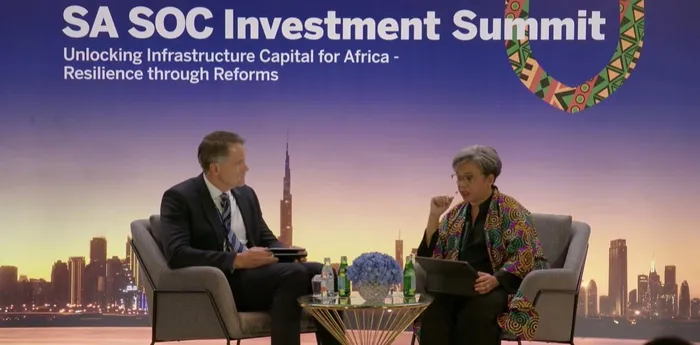
Transnet CEO Michelle Phillips was speaking in a wide-ranging discussion on the company’s turnaround efforts at the 5th SA SOC Investment Summit hosted by Standard Bank Group in Dubai on Tuesday.
Image: LinkedIn Screengrab
Transnet has reassured investors of its commitment to an ambitious R127 billion capital expenditure plan over the next five years as it works to modernise South Africa’s rail and port network, tackle theft and vandalism, and open the system to private operators.
This comes as the State-owned freight and logistics operator continues to ramp up volumes after moving nearly 160 million tons of freight in the year ended 31 March 2025 compared to 151 million tons the previous year.
Freight volumes had been in steep decline since Transnet’s peak year in 2017/18, when it moved well over 200 million tons.
Speaking in a wide-ranging discussion on the company’s turnaround efforts at the 5th SA SOC Investment Summit hosted by Standard Bank Group in Dubai on Tuesday, Transnet CEO Michelle Phillips acknowledged that the freight system has been plagued by significant losses.
Phillips said engagement with customers and labour unions, alongside an 18-month recovery plan, helped to stabilise operations.
“Other than the 23% decline, we’ve still lost about four-and-a-half million tonnes, purely due to theft and vandalism. If you take that conservatively and you put a tariff to that, that's a few billion rands there that was lost,” Phillips said.
She said that pipeline attacks once reached 26 incidents in a single month but have since dropped to around 1.5 incidents monthly, thanks to stronger security interventions.
“We want sustainable change. With reforms and private sector partnerships, we believe Transnet can once again become a strong backbone of South Africa’s freight logistics network.”
For the 2026 financial year, Transnet is targeting freight volumes of 180 million tons while pressing ahead with capital projects and maintenance plans.
At the heart of the reforms is the Network Statement, first gazetted in December 2024, which provides investors and train operating companies with critical data on tariffs, infrastructure conditions, and access rules.
While industry feedback has flagged concerns about bankability and infrastructure reliability, Phillips confirmed a new iteration of the statement will be released before the end of 2025.
She said the Network Statement deal with concerns raised around its bankability, including the complexity of the tariffs, the condition of the infrastructure and the lack of recourse to the extent that Transnet cannot deliver service due to failing infrastructure.
"So there will be another iteration of the Network Statement that will be published, trying to take into account some of these. You're not going to get everything that you want. We really want something that we think is the best fit for the South African industry and the economy," she said.
"But we also want the system to be open. And we can't have criteria that makes it difficult. So we don't want to create new barriers. The important thing is to get private operators onto the system, and to also then support them should they fall short. So we do see the Network Statement coming out with a few more changes."
The freight utility has already launched a slot allocation process, attracting 11 qualified bidders offering to move 20 million tons of cargo over the next two years. South Africa’s long-term goal is to shift 250 million tons by 2030.
To ease the entry of new operators, Transnet plans to establish a leasing company (LeaseCo) to make underutilised locomotives and wagons available. The fleet includes some 20 000 wagons and around 1 000 locomotives, though many require refurbishment.
On the investment front, Transnet is preparing several Public–Private Partnership (PPP) transactions, including the Richards Bay dry bulk terminal expansion (November 2025), a new manganese export facility and corridor (early 2026), the long-awaited Durban Pier 2 container terminal concession, pending court approval, and a proposed automotive corridor project linking Gauteng and the Eastern Cape.
Despite progress, financial constraints remain tight. Transnet’s debt now stands at around R199 billion, backed by State guarantees. The company has renegotiated its government facility agreement and continues to seek infrastructure funding.
The SA SOC Investment Summit is a key platform designed to connect South African State-Owned Companies with leading Gulf region investors, sovereign wealth funds, and corporates to accelerate infrastructure development and trade between Africa and the Middle East.
Luvuyo Masinda, CEO for corporate and investment banking at Standard Bank Group, said the summit’s agenda reflected South Africa’s ambition to attract long-term, sustainable investment.
Delegates explored opportunities ranging from the port expansions to grid transmission upgrades requiring over R350bn in funding, and the R900bn water infrastructure programme set for delivery by 2030.
“This year’s theme of resilience through reforms reflects the ongoing work to build an environment that attracts investment in Africa,” Masinda said.
“The Gulf’s capital and expertise, combined with the continent’s growth potential, can unlock a new chapter in infrastructure development that benefits all.”
BUSINESS REPORT